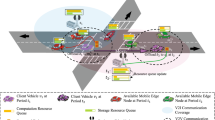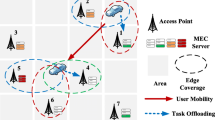Abstract
With the increasing complexity of autonomous driving tasks, the computational demands on single vehicular computing units have escalated, more and more tasks need to be offloaded to the edge. These tasks vary in latency sensitivity: real-time tasks, critical for passenger safety, require strict deadline adherence, whereas the latency of standard tasks mainly affects the user experience and has more flexible constraints. Addressing the challenge of selecting suitable edge computing nodes to enhance the offloading success rate of real-time tasks amidst a vast and heterogeneous cluster becomes crucial. This paper introduces the adaptive priority-based hierarchical task offloading (APHTO) algorithm, which optimizes task offloading strategies by accounting for the diverse latency constraints of different task types. Experiments demonstrate that under optimal performance conditions, APHTO significantly outperforms existing algorithms such as Min–Min, Max–Min, CUS, and FMS in reducing task latency by 20.31%, increasing offloading success rates by 35.83%, and improving resource utilization by 30.21%, marking a substantial advancement in task offloading strategies for autonomous driving integrated with MEC.















Similar content being viewed by others
Availablity of data and materials
All data were collected by the authors and are therefore available for use. JiaCheng Lin, HuanLe Rao, SongSong Liang, YuMiao Zhao, Qing Ren, GangYong Jia will make every effort to provide complete access to all data and materials used in this study upon request. We acknowledge that the availability of these resources can help to facilitate scientific progress and promote transparency and openness in researchers’ work.
References
Hassan N, Yau K-LA, Wu C (2019) Edge computing in 5G: a review. IEEE Access 7:127276–127289
Intel, data is the new oil in the future of automated driving 11-15 (2016)
Chen C, Guo R, Zhang W, Yang J, Yeo CK (2022) Optimal sequential relay-remote selection and computation offloading in mobile edge computing. J Supercomput 78(1):1093–1116
Martin P (2023) Autonomous vehicles worldwide—statistics & facts. Statista
Marco della Cava (2016) Tesla announces fully self-driving cars. USA Today
Liu Y, Wang S, Zhao Q (2020) Dependency-aware task scheduling in vehicular edge computing. IEEE Internet Things J 7(6):4961–4971
Baktir AC, Ozgovde A, Ersoy C (2017) How can edge computing benefit from software-defined networking: a survey, use cases, and future directions. IEEE Commun Surv Tutor 19(4):2359–2391
Teng H, Li Z, Cao K (2022) Game theoretical task offloading for profit maximization in mobile edge computing. IEEE Trans Mob Comput 22(9):5313–5329
Zhang L, Chai R, Yang T (2020) Min–max worst-case design for computation offloading in multi-user MEC system. In: IEEE INFOCOM 2020-IEEE Conference on Computer Communications Workshops (INFOCOM WKSHPS). IEEE, 2020: 1075-1080
Wang LL, Gui JS, Deng XH (2020) Routing algorithm based on vehicle position analysis for internet of vehicles. IEEE Internet Things J 7(12):11701–11712
Yang F, Wang S, Li J (2014) An overview of internet of vehicles. Chin Commun 11(10):1–15
Xiao Z, et al (2022) Multi-objective parallel task offloading and content caching in D2D-aided MEC networks. IEEE Trans Mob Comput 22(11):495–6507
Jiang H et al (2022) Joint task offloading and resource allocation for energy-constrained mobile edge computing. IEEE Trans Mob Comput 22(7):4000–4015
Ren Ju, et al (2022) "An efficient two-layer task offloading scheme for MEC system with multiple services providers". In: IEEE INFOCOM 2022-IEEE Conference on Computer Communications. IEEE
Zhang R et al (2024) Incentive mechanisms for online task offloading with privacy-preserving in UAV-assisted mobile edge computing. IEEE/ACM Trans Networking. https://doi.org/10.1109/TNET.2024.3364141
Chen Y et al (2023) Energy efficient task offloading and resource allocation in air-ground integrated MEC systems: a distributed online approach. IEEE Trans Mob Comput. https://doi.org/10.1109/TMC.2023.3346431
Han Bin et al (2022) Impatient queuing for intelligent task offloading in multiaccess edge computing. IEEE Trans Wirel Commun 22(1):59–72
Zhou X et al (2023) DAG-based dependent tasks offloading in MEC-enabled IoT with soft cooperation. IEEE Trans Mob Comput. https://doi.org/10.1109/TMC.2023.3328333
Chu Weibo, et al (2022) Online optimal service selection, resource allocation and task offloading for multi-access edge computing: a utility-based approach. IEEE Trans Mobile Comput
Diamanti M et al (2023) Delay minimization for rate-splitting multiple access-based multi-server mec offloading. IEEE/ACM Trans Networking 99:1–13
Mu Liting et al (2023) Deep reinforcement learning based adaptive threshold multi-tasks offloading approach in MEC. Comput Netw 232:109803
Tran TX, Hajisami A, Pandey P et al (2017) Collaborative mobile edge computing in 5G networks: new paradigms, scenarios, and challenges. IEEE Commun Mag 55(4):54–61
Li W, Jin S (2021) Performance evaluation and optimization of a task offloading strategy on the mobile edge computing with edge heterogeneity. J Supercomput 77(11):12486–12507
Shahryari O-K, Pedram H, Khajehvand V, TakhtFooladi MD (2021) Energy and task completion time trade-off for task offloading in fog-enabled IoT networks. Pervasive Mob Comput 74(5):101395
Almutairi J, Aldossary M (2021) A novel approach for IoT tasks offloading in edge-cloud environments. J Cloud Comput 10(1):10–28
Liu J, Mao Y, Zhang J, et al (2016) Delay-optimal computation task scheduling for mobile-edge computing systems. In: IEEE International Symposium on Information Theory (ISIT), Barcelona IEEE pp. 1451-1455
Mao Y, Zhang J, Letaief KB (2016) Dynamic computation offloading for mobile-edge computing with energy harvesting devices. IEEE J Sel Areas Commun 34(12):3590–3605
Zhang K, Mao Y, Leng S, et al. (2017)Optimal delay constrained offloading for vehicular edge computing networks. In: IEEE International Conference on Communications (ICC), Paris IEEE 1-6
Jia M, Cao J, Yang L (2014) Heuristic offloading of concurrent tasks for computation-intensive applications in mobile cloud computing. In: IEEE Conference on Computer Communications Workshops (INFOCOM WKSHPS) Toronto 352-357
Zhao H, Geng J, Jin S (2023) Performance research on a task offloading strategy in a two-tier edge structure-based MEC system. J Supercomput 79(9):10139–10177
Kamoun M, Labidi W, Sarkiss M (2015) Joint resource allocation and offloading strategies in cloud enabled cellular networks. In: IEEE International Conference on Communications (ICC), London 5529–5534
Labidi W, Sarkiss M, Kamoun M (2015) Energy-optimal resource scheduling and computation offloading in small cell networks. In: International Conference on Telecommunications (ICT), Sydney 313–318
Zhang H, Guo J, Yang L, et al (2017) Computation offloading considering fronthaul and backhaul in small-cell networks integrated with MEC. In: IEEE Conference on Computer Communications Workshops (INFOCOM WKSHPS), Atlanta 115-120
You C, Huang K (2016) Multiuser resource allocation for mobile-edge computation offloading. In: IEEE Global Communications Conference (GLOBECOM), Washington 1-6
You C, Huang K, Chae H et al (2016) Energy-efficient resource allocation for mobile-edge computation offloading. IEEE Trans Wirel Commun 16(3):1397–1411
Cao Kun, Weng Jian, Keqin Li (2023) Reliability-driven end-end-edge collaboration for energy minimization in large-scale cyber-physical systems. IEEE Trans Reliability PP(99):1–15
Wang Zhongmin, Ding Yurong, Jin Xiaomin, Chen Yanping, Gao Cong (2023) Task offloading for edge computing in industrial Internet with joint data compression and security protection. The J Supercomput 79:4291–4317
Munoz O, Pascual-Iserte A, Vidal J (2014) Optimization of radio and computational resources for energy efficiency in latency-constrained application offloading. IEEE Trans Vehicular Technol 64(10):4738–4755
Nan Y, Li W, Bao W et al (2017) Adaptive energy-aware computation offloading for cloud of things systems. IEEE Access 5(1):23947–23957
Wang W, Zhou W (2017) Computational offloading with delay and capacity constraints in mobile edge. In: IEEE International Conference on Communications (ICC), Paris 1-6
Taleb T, Samdanis K, Mada B (2017) On multi-access edge computing: a survey of the emerging 5G network edge cloud architecture and orchestration. IEEE Commun Surv Tutor 19:1657–1681
Ullaha R, Rehmanb MAU, Naeemc MA et al (2020) ICN with edge for 5G: exploiting in-network caching in ICN-based edge computing for 5G networks. Future Gener Comput Syst 111:159–174
Shaohua W, Xiang L, Yuan X et al (2020) Efficient computation offloading for internet of vehicles in edge computing-assisted 5G networks. J Supercomput 76:2518–2547
Vahabi M, Ghazvini M, Mohd Fadlee AR, et al (2007) Trade-off between energy consumption and target delay for wireless sensor network. In: Proceedings of the 2007 IEEE International Conference on Telecommunications and Malaysia International Conference on Communications pp. 545-549
Acknowledgements
The work was supported by the National Natural Science Foundation of China under Grant No. U20A20386, Zhejiang Key Research and Development Program under Grant No. 2023C03194 and No. 2023C03090, Zhejiang Natural Science Foundation under Grant No. QY19E050003, the Key Laboratory fund general project under Grant No. 6142110190406, the key open project of 32 CETC under Grant No. 22060207026, and ZheJiang Education Department General Scientific Research Project under Grant No. Y201738340.
Funding
This research was funded by National Natural Science Foundation of China, Zhejiang Key Research and Development Program, Zhejiang Natural Science Foundation, the Key Laboratory fund general project, the key open project of 32 CETC and ZheJiang Education Department General Scientific Research Project. The funders played no role in the design of the study, data collection, analysis and interpretation, or writing of the manuscript. JiaCheng Lin, HuanLe Rao, SongSong Liang, YuMiao Zhao, Qing Ren, GangYong Jia acknowledge the support of funders for this research. We would also like to express our gratitude to all other supporters who have contributed to this study.
Author information
Authors and Affiliations
Contributions
JiaCheng Lin, HuanLe Rao, SongSong Liang, YuMiao Zhao, Qing Ren, GangYong Jia contributed to this study in the following ways: JiaCheng Lin and SongSong Lin were involved in the conceptualization, methodology, formal analysis, investigation, and writing—original draft preparation. HuanLe Rao, YuMiao Zhao, and Qing Ren contributed to the methodology, data curation, formal analysis, and writing—review and editing. GangYong Jia and HuanLe Rao assisted in the supervision, project administration, funding acquisition, and writing—review and editing. All authors have read and agreed to the published version of the manuscript.
Corresponding authors
Ethics declarations
Conflict of interest
The authors declare no Conflict of interest. JiaCheng Lin declare that no person or entity has, within the past two years, had in any significant financial, professional or personal conflicts or otherwise influenced the conduct or findings of this research. We declare that there are no other Conflict of interest related to this study.
Additional information
Publisher's Note
Springer Nature remains neutral with regard to jurisdictional claims in published maps and institutional affiliations.
Appendix
Appendix
1.1 Model and system environments
To facilitate replication by researchers, we detail the specific hardware parameters and system versions used in our simulation environment. This environment includes mobile nodes, labeled as num 1, 2, 3, 4, and 8, and MEC (Mobile Edge Computing) nodes, identified as num 6 and 7. Notably, nodes num 1 and 2 are each equipped with two devices, underscoring their unique configuration within the simulation setup (Table 4).
Rights and permissions
Springer Nature or its licensor (e.g. a society or other partner) holds exclusive rights to this article under a publishing agreement with the author(s) or other rightsholder(s); author self-archiving of the accepted manuscript version of this article is solely governed by the terms of such publishing agreement and applicable law.
About this article
Cite this article
Lin, J., Rao, H., Liang, S. et al. Aphto: a task offloading strategy for autonomous driving under mobile edge. J Supercomput 80, 16013–16045 (2024). https://doi.org/10.1007/s11227-024-06054-4
Accepted:
Published:
Issue Date:
DOI: https://doi.org/10.1007/s11227-024-06054-4




